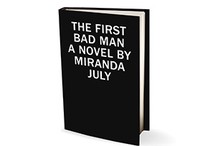The First Bad Man
By Miranda July
288 pages;
Scribner
At 43, Cheryl Glickman, the beautifully bittersweet—and at times unhinged—protagonist of Miranda July's The First Bad Man, has been afflicted with globus hystericus (the proverbial lump in the throat) for most of her life. She resides alone in a well-defined "system," a meticulously maintained bubble of her own making. She has no children, but is haunted by the memory of a baby boy she met when she was 9. She carries a torch for Phillip, a mid-60s board member of Open Palm, the fitness studio for women where she works; Phillip in turn lusts after a 16-year-old and can't stop discussing the topic with Cheryl.
Open Palm sells exercise videos based on self-defense techniques, a concept that Cheryl claims she "pretty much invented." While concocting urgent new reasons to be in touch with Phillip, she fine-tunes the internal autopilot that keeps her humming along even when she's down in the dumps, which is often: "When things really flow, my days become dreamlike, no edges anywhere, none of the snags and snafus that life is so famous for. After days and days alone it gets silky to the point where I can't even feel myself anymore, as if I don't exist."
Enter Clee, the sullen 20-year-old daughter of Cheryl's semi-retired bosses, Carl and Suzanne. An unwanted houseguest, Clee plants herself on Cheryl's living room sofa, from which she radiates contempt. She thinks nothing of shoving her host or backing her into a corner, ultimately forcing Cheryl to physically defend herself. But over time these altercations weirdly come to resemble foreplay. Miraculously, the globus in Cheryl's throat disappears—and she finds herself falling in love, first with Clee and then with the baby she's always wanted.
July is brilliant, hilarious, irreverent, piercing—even cringe-inducing, powering past sexual boundaries and gender identification into the surprising galaxy of primal connection. "We all think we might be terrible people. But we only reveal this before we ask someone to love us. It is a kind of undressing." Is there a more hopeful statement about humankind? In Miranda July's strange universe, probably not.
— Jayne Anne Phillips


